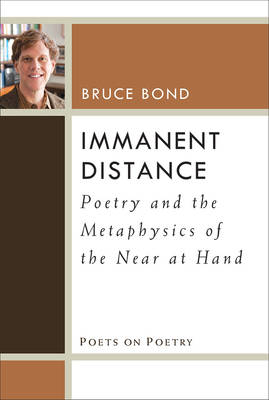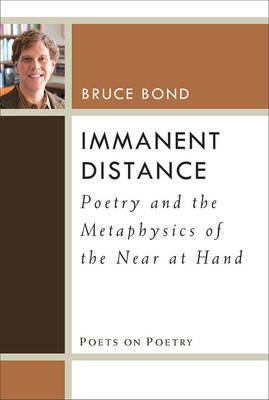
- Afhalen na 1 uur in een winkel met voorraad
- Gratis thuislevering in België vanaf € 30
- Ruim aanbod met 7 miljoen producten
- Afhalen na 1 uur in een winkel met voorraad
- Gratis thuislevering in België vanaf € 30
- Ruim aanbod met 7 miljoen producten
Zoeken
Omschrijving
In these essays, Bruce Bond interrogates the commonly accepted notion that all poetry since modernism tends toward one of two traditions: that of a more architectural sensibility with its resistance to metaphysics, and that of a latter-day Romantic sensibility, which finds its authority in a metaphysics authenticated by the individual imagination. Poetry, whether self-consciously or not, has always thrived on the paradox of the distant in the immanent and the other in the self; as such, it is driven by both a metaphysical hunger and a resistance to metaphysical certainty. Hidden resources of being animate the language of the near, just as near things beckon from an elusive and inarticulate distance. Bond revalidates the role of poetry and, more broadly, of the poetic imagination as both models for and embodiments of a transfigurative process, an imperfectly mimetic yet ontological engendering of consciousness at the limits of a language that must--if cognizant of its psychological, ethical, and epistemological summons--honor that which lies beyond it.
Specificaties
Betrokkenen
- Auteur(s):
- Uitgeverij:
Inhoud
- Aantal bladzijden:
- 228
- Taal:
- Engels
- Reeks:
Eigenschappen
- Productcode (EAN):
- 9780472052837
- Verschijningsdatum:
- 24/09/2015
- Uitvoering:
- Paperback
- Formaat:
- Trade paperback (VS)
- Afmetingen:
- 137 mm x 203 mm
- Gewicht:
- 299 g

Alleen bij Standaard Boekhandel
+ 83 punten op je klantenkaart van Standaard Boekhandel
Beoordelingen
We publiceren alleen reviews die voldoen aan de voorwaarden voor reviews. Bekijk onze voorwaarden voor reviews.











